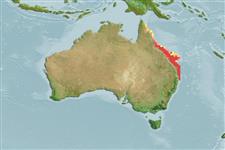Elasmobranquios (tiburones y rayas) (sharks and rays) >
Orectolobiformes (Carpet sharks) >
Brachaeluridae (Blind sharks)
Etymology: Brachaelurus: brachys (Gr.), short, referring to short and stout body; aelurus, from ailouros (Gr.), cat, i.e., a short catshark (See ETYFish); colcloughi: In honor of Ogilby’s friend John Colclough, Amateur Fisherman’s Association of Queensland, who collected many specimens for Ogilby (See ETYFish).
Eponymy: John Colclough was a friend of the author. He was a keen fisherman, member of the Amateur Fisherman’s Association of Queensland and collector, and later sent a considerable collection to Ogilby from the Aru Islands and the Northern Territory of Australia. (Ref. 128868), visit book page.
More on author: Ogilby.
Issue
See CofF and Ref. 48863.
Environment: milieu / climate zone / depth range / distribution range
Ecología
marino demersal; rango de profundidad 4 - 217 m (Ref. 106604). Subtropical; 12°S - 29°S, 143°E - 154°E
Southwest Pacific: endemic to Australia.
Tamaño / Peso / Age
Maturity: Lm ? range ? - ? cm
Max length : 76.0 cm TL macho / no sexado; (Ref. 13576)
Espinas dorsales (total) : 0; Espinas anales: 0. No white spots on body (Ref. 13576). Caudal fin with its upper lobe at a low angle above body axis, with a strong terminal lobe and subterminal notch but no ventral lobe (Ref. 13576).
A little-known shark found on the continental shelf close inshore (Ref. 247). Feeds on benthic invertebrates (Ref. 43278). Ovoviviparous (Ref. 43278, 50449).
Life cycle and mating behavior
Madurez | Reproducción | Puesta | Huevos | Fecundidad | Larva
Ovoviviparous, embryos feed solely on yolk (Ref. 50449). Distinct pairing with embrace (Ref. 205).
Goto, T., 2001. Comparative anatomy, phylogeny and cladistic classification of the order Orectolobiformes (Chondrichthyes, Elasmobranchi). Mem. Grad. Sch. Fish. Sci. Hokkaido Univ. (MGSFSHU), v. 48 (no. 1):1-100. (Ref. 48863)
IUCN Red List Status (Ref. 130435: Version 2024-1)
Threat to humans
Harmless
Human uses
Pesquerías: escaso valor comercial
Herramientas
Special reports
Download XML
Fuentes de Internet
Estimates based on models
Preferred temperature (Ref.
123201): 23.7 - 25.5, mean 24.7 °C (based on 50 cells).
Phylogenetic diversity index (Ref.
82804): PD
50 = 1.0000 [Uniqueness, from 0.5 = low to 2.0 = high].
Bayesian length-weight: a=0.00389 (0.00180 - 0.00842), b=3.12 (2.94 - 3.30), in cm total length, based on all LWR estimates for this body shape (Ref.
93245).
Nivel trófico (Ref.
69278): 3.5 ±0.37 se; based on food items.
Resiliencia (Ref.
120179): Bajo, población duplicada en un tiempo mínimo de 4.5-14 años (Fec assumed to be <100).
Fishing Vulnerability (Ref.
59153): Moderate to high vulnerability (50 of 100).
